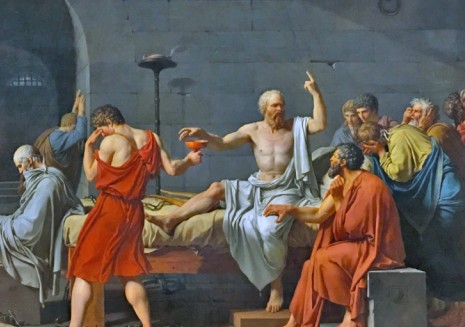
A few days ago, I came across the story of a Cleombrotus of Ambracia, a Greek who, after allegedly having read Plato's Phaedo, is said to have thrown himself into the sea in order to experience the real life, that of the disembodied soul as depicted in that book. Baffled by the story, I did a search on the internet, but it just delivered news about a king of Sparta of the same name. So, I had to refine my quest to finally find some information about the other Cleombrotus. Given a character so faint—a fleeting mention, amounting to no more than a philosophical footnote, I'd say—I thought we could easily assume he was the invention of a sly commentator eager to make fun of Plato's allegories, or either—on the contrary—to hyperbolically extol the force of Plato's depiction of the afterlife by making up a reader so impressed by it as to seek death in order to experience the real thing.
After a while, I found out there was one Cleombrotus in the circle of Socrates' disciples, so he must be our man. He is mentioned as absent (as was Plato, due to some illness) the fateful day Socrates took the hemlock. As a matter of fact, I now think the only contemporary mention of him is in Plato's work (in the Phaedo, of all his books, go figure!), but this is probably reason enough to take his existence as real. Knowing this, we can now envision a third possibility: let's suppose a nice summer day by the Aegean sea. The sun shines, the temperature is perfect to go swimming. Some folks are enjoying themselves at the beach, no doubt the few bearded ones were in the circle of the late Socrates years ago. Now, one of them, a guy in his sixties or so, makes a bet he'd swim to this rock there yonder and back. The others smile—this is the kind of jokes intellectuals enjoy. They pretend they are taking the bet to follow the joke, and the last thing they see is Cleombrotus awkwardly heading to the rock—which he never reached.
Taking this as a likely event, is it far-fetched to imagine that a few months later, a poet who knew him well would compose a panegyric honoring the divine Cleombrotus? He would there praise his friend, a philosopher so deeply touched by the picture of the afterlife in the Phaedo that he would not hesitate to throw himself into the sea in order to experience it firsthand.